The $600bn outsourcing service-marketplace
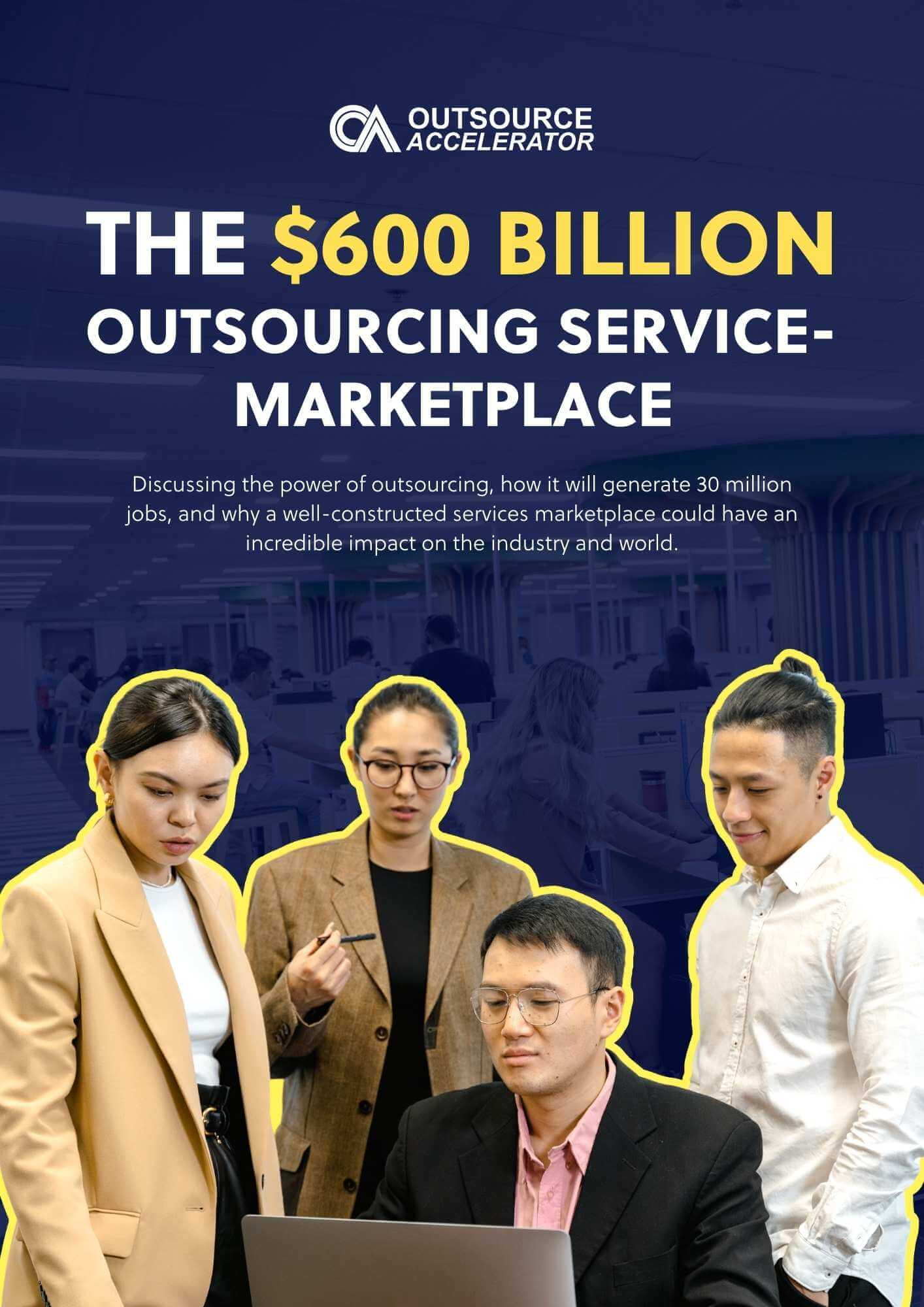
Introduction – to the future of employment
Outsourcing is a little known, and largely misunderstood tool for business. Yet, it is probably the single most powerful tool out there, which can literally transform a company’s profits and prospects for growth.
Outsourcing has been around for 25 years, but has only now, just become accessible to small and medium-sized businesses.
There is an upcoming ‘next wave’ of outsourcing, which has the potential to generate 30 million more jobs and $600bn of economic activity – all catalysed by the fast-advancing globalisation and technology.
However, the adoption and proliferation of offshore staffing is hampered by the fact that the clients – by definition – are in one country, and the suppliers are across the world, in another – often developing – nation. This distance, amongst other factors, creates opacity, distrust and hesitation. Clients tend not to start their offshore staffing journey, because it is just a little too complex, and a little too unorthodox.
This situation is seriously hampering the prospects for the client’s business, as much as it is the outsourcing suppliers.
The clients in the West deserve an easier way to learn about, explore and access professionalised offshore services.
This white paper outlines the argument for the power of outsourcing, how it will generate 30 million jobs, and why a well-constructed services marketplace, could have an incredible impact on the industry and world.
A brief history of offshore outsourcing
America and the ‘West’ has been outsourcing to the Philippines and India for the last 25 years. As soon as international telephony became cheap enough, someone realised that American call centers could be managed by people sitting in the Philippines at a fraction of the cost.
As we all know, IT and telecommunications have improved exponentially over that time. The internet soon replaced basic telephony, and as the bandwidth and use of the internet expanded, the applications of outsourcing equally grew. Outsourcing started with call centers, but now serves literally any role/function that can be done in front of a computer – which is now 80% of the functions of 99% businesses, across 99% of business sectors.
In the beginning, access to outsourcing was strictly limited to the ‘Fortune 500’ companies of the world. The setup and infrastructure costs were so great, that companies needed a massive scale to justify the setup and ongoing costs. Outsourcing clients back then would typically have a minimum of 500-1000 people performing one business function.
Now, as technology, servers, software and everything is in the cloud and at a fraction of the cost, outsourcing has become infinitely cheaper, more flexible, and as a result, available to the Small and Medium-Sized Enterprises (SMEs) of the world. Now, there is a new breed of outsourcing suppliers, that offer more affordable and flexible services. These new outsourcing suppliers now work with SMEs, require just 1-2 full-time people – and offer more flexible contracts to boot.
However, access does not mean adoption. Despite the fact the world’s major corporations have all been outsourcing for decades – 95% of the big companies outsource, only 0.5% of the SMEs have tried it.
To put the potential market into perspective, the ‘West’ has about 35 million SMEs. If 80% of those SMEs eventually outsource, that’s another 30-60 million jobs on the way…
Why outsource?
The primary reason for outsourcing is simple: you can save 60%-80% on your staffing costs.
There are very few tools out there that can have such a profound effect on an organisation, and its P&L, than a 70% reduction on one of its equally most critical, and most expensive inputs.
The primary benefit of outsourcing is simple and clear, but let’s delve a little deeper into the secondary considerations.
Outsourcing is not all about cost savings. For savings to make sense, they cannot be at the cost of income, customers, output or quality. So it is critical to realise that outsourcing offers a ‘net’ saving of 70% when considering all of the different structural impacts and considerations.
Equally, these savings cannot come at the expense of great inefficiency or ‘friction’. If there is too much friction in doing something, then even if you save 90%, it just wouldn’t be worth doing. Thus, it’s important to realise that successful outsourcing, can, and must be delivered with minimal friction compared to traditional operations.
Outsourcing is not just about mitigating cost and friction. The biggest opportunity lays in the vast upside. If you have access to abundant, highly skilled resources, at a 70% discount to your competitor, you have a huge competitive and strategic advantage. Abundant cheaper human resource can allow your organisation to research, market, sell, service customers, develop products and explore new markets – better, faster, cheaper and more frequently than everyone else. This is where outsourcing gets really exciting – not least for SMEs where resources are tight.
Education and awareness
The adoption of outsourcing in the SME sector is in the early stages. The very fact that I had to give an introduction to outsourcing at the start of this article illustrates that the understanding and adoption of the outsourcing industry is still very nascent. In contrast, when people first described Uber, they didn’t have to first define what taxis were, and why people use them.
Outsourcing is beset by people not really understanding what it is, mistaking it for the ‘Tim Ferriss style of side-hustle freelancing’, or generally defaulting to doubting its efficacy. This is similar to the ‘early non-adopters’ of tech. When a market is nascent, it simply means that the customers need a lot of education and nurturing.
Managed marketplaces – a place for education, curation and advisory
Marketplaces have not commonly been built around services – they typically focus on products. This is for a number of good reasons. Services, compared to physical products, are typically:
- more complex and difficult to define and categorise
- the outcomes are less binary, more qualitative and open to dispute
- ongoing in nature and often with dependencies
- higher value and non-finite cost structures
It is for these reasons that services are not easily, and thus uncommonly, aggregated into platforms.
Ironically though, it is exactly this complexity and difficulty that justifies the existence of a marketplace in the services space. If a marketplace can make something that is complex, more simple, then the marketplace is adding tremendous value and will catalyse more sales.
Because outsourcing is not only a high-value services sector, but it is also a nascent, misunderstood and under-appreciated sector, then there is an even stronger argument for a managed marketplace, such as Outsource Accelerator, in this space. The managed marketplace offers much-needed education and curation and builds awareness, comfort and trust – as a part of its service offering.
SMEs as ‘B2C consumers’
If we are to coax more SMEs into outsourcing, it’s important to realise that they make business decisions differently to their enterprise counterparts. SMEs think, act and consume, more like a B2C consumer than an enterprise. This is because it is really just a consumer (ie 1-2 people) at the helm of an SME, and not a structured corporate process, which is typically making the decisions on behalf of enterprises.
B2C consumers are now used to, and expect, marketplaces, aggregators and comparison sites, to guide their buying decisions, and expect easy contracts, quick onboarding processes, flexible terms, and easy cancellation and refunds when buying.
If we want SMEs to engage in outsourcing, then the outsourcing marketplace needs to follow these similar protocols.
Service-based marketplaces
Service-based managed marketplaces are slowly on the rise. However, not all services are created equal. A manicure service differs greatly from a private wealth management service. Some services can be complex, yet low value – like massage (lots of things can go wrong with massages), whereas others can be much higher value, with less complexity.
Another great thing about B2B services is that they are generally much higher value than B2C services. They aren’t necessarily less complex, but the higher value and ongoing long-term nature can more than compensate for this. Outsourcing is a high-value service with typical engagements priced at $15,000-$150,000 per year, extending for many years, and with low attrition rates.
A market-maker, not just an aggregator
Outsource Accelerator is as much a market maker as it is an aggregator. A successful marketplace will not only ease entry into outsourcing, but it will grow the overall size of the market, because it raises awareness, and makes outsourcing easier to understand, engage with, and adopt.
Apple is a good example where they created a huge new economy from their iPhone Apps – where previously nothing existed. Apple doesn’t just make buying the apps easier, it actually created the use case and demand for Apps. Without Apple, there were no Apps.
The good thing about creating a market is that you can then make the rules of the market. The market-maker effectively becomes the governing body of that market. People have to agree to Apple’s terms, otherwise, they are locked out. This is a very powerful position to be in.
Outsource Accelerator isn’t exactly ‘inventing’ outsourcing, but it has a good shot as being the first to create a significant fluid marketplace for SMEs, and as such, have significant influence over how people engage within that marketplace.
New employment – a globalised market
The interpersonal structure of employment will not radically change over the coming decades. Humans have been organising themselves in a similar fashion for the last few millennia.
However, globalization will have a dramatic impact on the ‘pool’ from which we hire. Globalisation will eventually make one big employment pool, instead of the current geographically fractured marketplace.
Freelancing platforms such as Upwork and Freelancer offer new approaches to short-term and project-based employment. But this isn’t a substitute for ‘real employment’ in a traditional sense, and generally, the short-term nature and ‘free-for-all’ market means that some (both supplier and consumer) walk away disappointed from their experience. These platforms have demonstrated that freelancing is a useful tool, suitable for startups on a budget and one-off projects, but users often find that the process is fraught with trial and error, and cannot be scaled.
For as long as there have been companies, there have been employees. Companies are powered by employees, and as companies grow they employ more people.
The key value proposition of outsourcing is that it is basically augmented managed employment for your business, but leverages an incredible 60%-90% discount on salaries, whilst maintaining or improving quality of output and efficiency.
Employment will be the same but the market size will grow
Globalisation removes the friction of distance and the relevance of location.
As the economy continues to move towards service and intellectual-property based work, the ‘wider bandwidth’ of the internet (greater capacity) and a deeper reliance on apps and software interfaces means that more and more can be done ‘online’ and remotely. This move to remote will inevitably lead to an increase the ubiquity of cross-border employment.
The exponential improvement and adoption of software – such as Slack, Skype, Zoom, chat, Trello boards etc – will mean that remote networking becomes more and more ubiquitous. ‘Young society’ has demonstrated that people enjoy and even prefer online communication. We see this with the millennials spending all day texting each other, interacting in Facebook communities and the massive rise in virtual gaming worlds (and gaming addiction).
As globalization and technology remove the geographic relevance of interaction, people will realise that there are countries such as The Philippines that offer equally qualified candidates, at an 80%+ discount. And outsourcing will become an increasingly obvious choice.
This all leads to a perfect storm for the next wave of outsourcing, and the pathway to 30 million outsourced roles.
The internet – making one big world
The future of employment will change as more people enter the market. Currently only 50% of the world’s population – 4 billion people – have access to the internet.
The early users (ie wealthy countries) of the internet were ‘consumers’. They consume content, games, and products through the internet. The latter entrants to the internet age – those in the developing economies – will increasingly be the ‘producers’ – the workers of the internet era.
Most of the four billion people, that aren’t online yet, commonly earn less than $5 per day. As education and cultural alignment rises (through Youtube, online forums, MOOCS and broader education) the potential prospective workforce of these countries will become more relevant and valuable. Market forces will mean that their salaries will eventually increase to parity to the West, but the large supply (4bn people entering the market) will mean that the salaries will remain low for a long time to come.
This long term view is largely irrelevant to the scope of this article, but it helps demonstrate that there are already many millions of people that are online, well educated, and, culturally aligned, that work for significantly lower salaries. The only ‘compromise’ is that they work remotely.
Outsourcing is a win-win
At this point, people might be concerned about the ‘hazardous ethical effects of outsourcing’. I have written many articles on this topic for people to reference. However, in short (i) globalisation is inevitable, (ii) one single, bigger networked economy is many times more powerful than numerous separated smaller economies which benefits all participants of the more powerful economy, and (iii) outsourcing is a catalyst for efficiency and growth, which is positive for all participants of a market. It is a win-win for all.
Friction to starting outsourcing – thus, need a platform
If you own a business, then outsourcing makes perfect sense. Yet, there is as yet, such low adoption by the SME population. This is the issue that Outsource Accelerator is addressing.
There is friction in commencing outsourcing because people aren’t aware of it and if they are they have concerns and misgivings. Very few people in SMEs really understand how it works. This is a major hurdle to overcome in terms of exploration and engagement.
Even once people are open to exploring outsourcing; because it is a complex ongoing service, the sales cycle is slower and complex. This means that uptake and engagement will be much slower. This is generally the nature of B2B services. It is slow-moving.
This complexity and friction is compounded by the fact that outsourcing is maybe the only industry in the world where, by definition, the customers are in one country, and the suppliers are in another country – typically a ‘developing country’. This tyranny of distance only adds to the transaction’s opacity, friction and distrust.
This complex relationship means that a managed marketplace is desperately needed.
$600bn – big market, big growth
If this was a small industry, the complexities might not justify the proposed solution. However, outsourcing is already a $25bn industry in the Philippines, a $200bn industry worldwide, and we project a staggering growth rate with an additional $600bn of activity over the coming years.
As globalisation, remote work and outsourcing become more normalised, then the outsourced workforce will expand from the current 4 million people to 34 million people.
Outsourcing is not new. The benefits have been successfully proven for 25 years, by its continued adoption from the world’s big corporations. Yet, adoption rates are low amongst the SMEs. I believe that this is simply because there isn’t a proper marketplace in existence – until now – that helps catalyse the growth. Without proper education, awareness, and curation – growth could remain low. However, with these things in place, growth could become exponential.
In that respect, it is the role of this managed marketplace to actually create the market demand, not just make it easier. Some marketplaces just make transacting easier – whereas some marketplaces actually create the market.
To refer back to the Uber example, there have always been taxis. But Uber made the experience infinitely easier, and potentially cheaper. So much so that Uber has catalysed a major shift away from car ownership, to ‘shared usage’. Taxis alone didn’t cause this shift, it was an efficient easy marketplace for taxis that created this.
Not creating a new market (that’s hard), just heralding next phase
It can be perilous if you try to enter a market too early. There are many examples of premature entrants losing their shirt. They say the pioneers are the ones with the arrows in their back.
With outsourcing, the opportunity looks bright. Outsourcing has existed and flourished for the last 25 years – and is heavily (95%) used by big corporations. Equally, there are many thousands of SMEs that currently successfully outsource, which is just a drop in a bucket, but at least it is a successfully proven model.
The recent $250m investment by Blackstone into TaskUs – showed the world that ‘smart money’ was investing in the outsourcing sector.
So the ‘product’ is not new, it has decades of proven efficacy.
In terms of building a marketplace representing a niche sector, this is nothing new. There are marketplaces representing almost every sector by now – from hotels to flights, to insurance, to banking, software, housing, and employment, business services and personal finance. As mentioned above, consumers and SMEs now almost expect, by default, to research and shop via online aggregators, comparison sites and marketplaces.
So marketplaces are certainly not new.
What I find most surprising is that there hasn’t yet been an outsourcing marketplace – it is about the only industry left that doesn’t yet have one.
So Outsource Accelerator is taking the established outsourcing industry and is applying a proven marketplace approach to promote and propagate it.
Good support from outsourcing suppliers
For a marketplace to succeed, participation needs to be a win-win for both sides of the market.
Outsourcing suppliers are fragmented. They are based in a developing country very far from the consumer. They have a lot of friction in terms of distrust, because they are a long way away, have a different culture, and are based in a developing country.
Also, despite being in the IT-BPM (IT & Business Process Management) industry, outsourcing suppliers are, unfortunately, generally highly unsophisticated in terms of their website, online presence, content, digital marketing and sales processes.
The industry suffers from a lack of general promotion of outsourcing to the SMEs and the West. Prospective customers generally don’t know, or misunderstand, what outsourcing is. If anything, the industry is marred by the customers’ vague awareness of Upwork – which is really a disappointing misrepresentation of outsourcing. Some people explore and try Upwork outsourcing, but then give up after a while and resolve that ‘outsourcing’ generally is ineffective and unreliable.
These are all huge hurdles for individual outsourcing suppliers to overcome. This is where a combined marketplace approach, offering ‘strength in numbers’, provides significant value to the individual players.
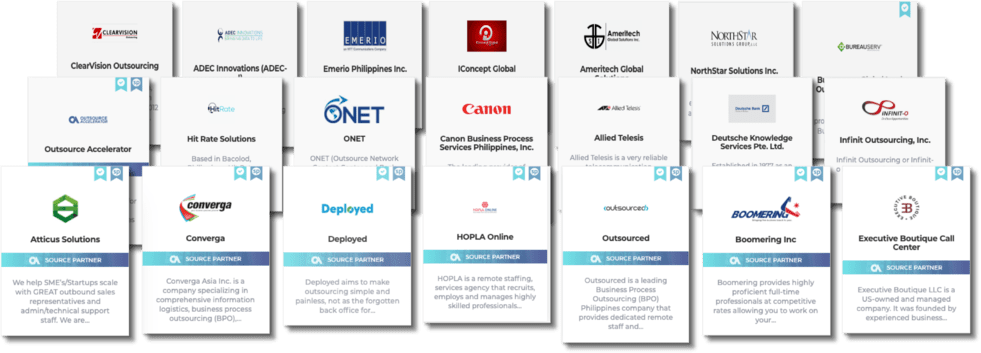
There are many similar comparisons between this and the hotel sector. Small hotels in far-flung locations do not have the marketing budget or know-how to get their name ‘out there’. Equally, customers trust researching and buying from Booking.com more than directly from the small far-flung hotels. As a result, the hotels get great value from the ‘aggregated’ power of the online hotel marketplaces such as Booking.com. And as a result, Booking.com has done extremely well.
No independent information for consumers
If people do research online for ‘outsourcing’ there is virtually zero independent information on the topic. Which is at odds with the fact that the topic is relatively esoteric, high value and complex.
Again, this is probably the only sector in the world where there is no independent source of information and no aggregator. Outsourcing direly needs the educational ‘stepping stones’, due to the friction, misunderstanding and the fact that the suppliers and customers are in different countries.
All these factors, again, contribute to low uptake and low adoption by SME customers, and a firm justification for an outsourcing marketplace.
No industry support (in distribution)
The iBPAP (IT & Business Processing Association of the Philippines) is the official association representing the Philippine outsourcing industry. Since outsourcing is the single biggest contributor to the Philippine economy, it is a highly powerful, respected and engaged association. However, this body has demonstrated little interest in representing the small high-growth SME outsourcing sector. iBPAP had grown up in service to the ‘big boys’ and they simply can’t see the opportunity in the ‘smaller masses’.
As an organisation representing the national interests of the IT outsourcing industry, they have a woeful website. They have intentions to improve it, but it’s too little too late. If you want to inquire about outsourcing suppliers, they offer and outdated downloadable excel spreadsheet.
The outsourcing trade associations are very well-meaning, but they are generally ‘internally facing’. Generally traded associations the world overlook internally to their industry and concern themselves with things like regulation, standards, lobbying, and membership. Very rarely do these associations concern themselves with addressing the industry’s customer-facing needs: education, promotion, outreach, nurturing and funnels.
Examples of this can be seen with the world’s old taxi and hotel associations. These have all been made virtually irrelevant by the consumer-facing solutions of Booking.com and Uber etc.
A win-win for suppliers
These things demonstrate that the individual players within the market are in need of the services that an aggregated marketplace provides. There is not only the prospect of making more sales, easier but the fact that a well-formed outsourcing marketplace can catalyse a further 30 million jobs – is an alluring prospect.
Other considerations
Regulated services marketplaces
They say there are strong oats and protective barriers if you manage to create a marketplace in regulated industries. There is no such regulation, to speak of in outsourcing – but there are plenty of existing barriers in terms of complexity. So I would consider an outsourcing marketplace as strategically strong as one within a regulated space.
Genuine expertise
Outsource Accelerator is truly an expert in outsourcing. This is not a platform built by techies, who recently swooped into an industry. The fact that the founder, Derek Gallimore, and the company is built around genuine knowledge and authority gives the platform extra credibility with both the customers and suppliers.
AI and automation
There is much talk of the outsourcing sector being decimated by AI and automation. This truly is a concern for the bigger end of town, but it won’t really touch the SME market.
For the big clients, when you have 1000 people in a room doing the same process, then this is ripe for automation. And this is, in fact, happening now. This is why big outsourcing suppliers are concerned.
However, the next wave of outsourcing deals with SMEs – and they have very variable dynamic needs. The operations, processes and roles of SMEs are continually in flux and evolving. No part of SMEs operations are set in stone, and everything can, and usually does, change from one quarter to the next. So SMEs are far more immune the threat of AI and automation (as explained in this article), as it’s very hard to automate things that don’t have the scale and are changing all the time. Thus, there is even more reason for the industry to support, and expect big things from SME outsourcing.
The below chart illustrates the industries move away from low skill, high-repetition roles towards higher-value ‘digital’ functions.
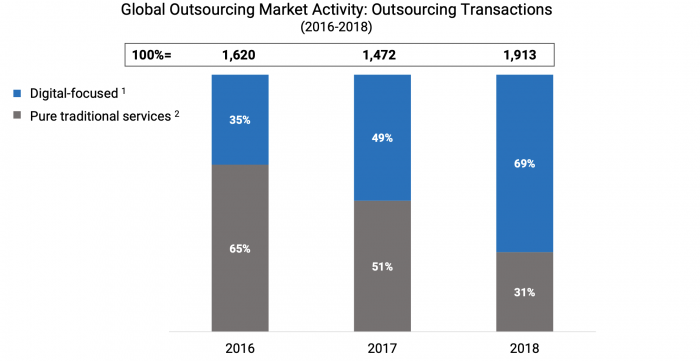
In summary
The internet, its technological interfaces, and the shift towards intellectual and computer-based work mean that globalisation of the employment landscape is having dramatic and sweeping effects.
The world is quickly becoming one grand marketplace instead of numerous fragmented ones. As the markets merge, the opportunity to access cheaper salaries becomes increasingly apparent.
Outsourcing has been happening for 25 years now, but SMEs – who have been locked out until recently – have been slow on the uptake. This is all about to change. There are potentially 30 million more jobs to be outsourced over the coming 15-20 years, worth over $600bn.
Outsourcing is in effect, the means to which the SMEs of the world access more affordable human resources.
Until now, there has been no outsourcing marketplace, and this is desperately needed. Service-based marketplaces are more complex, due to the nature of the services that they represent. However, a well-conceived marketplace can serve to simplify the complexity of the services, and thus add value to the consumer, which can lead to significantly increasing consumption.
The outsourcing suppliers are disaggregated and are in need of an aggregated, sophisticated approach to marketing and promotion of their sector to the world market.
These factors are combing to create a perfect opportunity, which is a win-win for all market participants.
Outsourcing can, and will, dramatically change the way that employment and business are done. Outsource Accelerator is excited about making the marketplace that will make this happen.


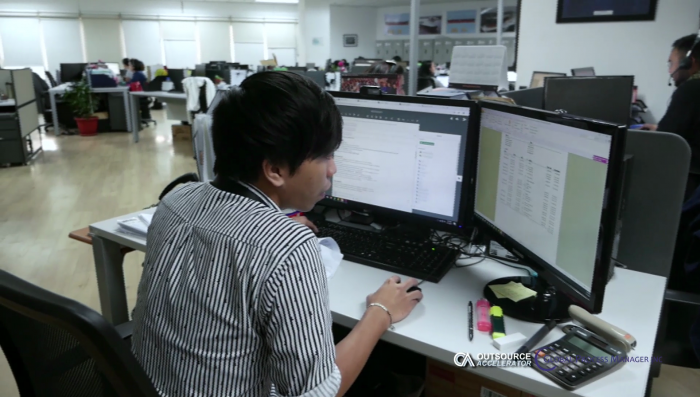
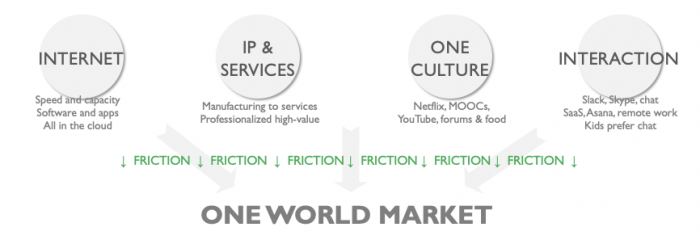








 Independent
Independent




